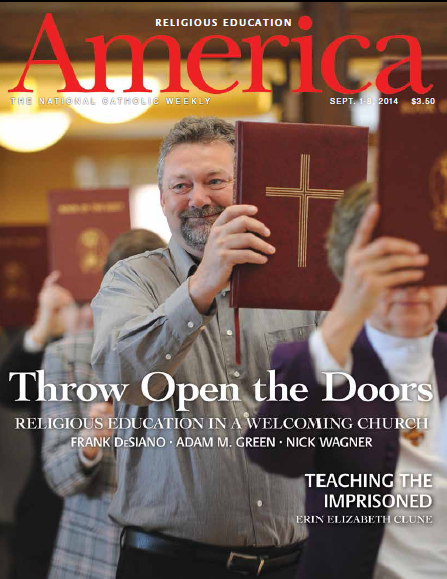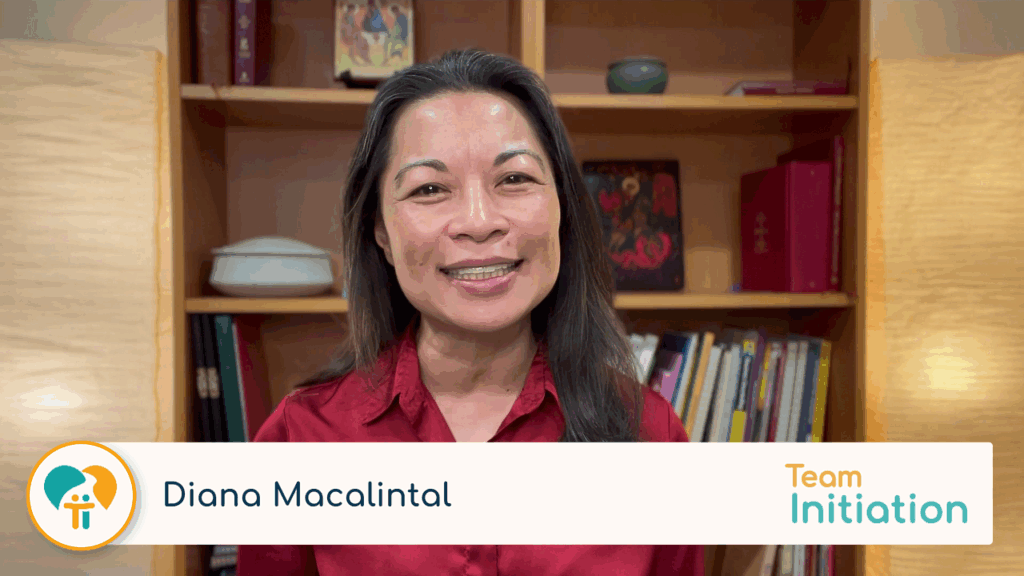 I submitted an article about the future of the RCIA to America, the Jesuit weekly news magazine, and they were kind enough to print it. In the article, I try to make the case that we are at a turning point in our use of the adult initiation rites. Here is the opening of the article:
I submitted an article about the future of the RCIA to America, the Jesuit weekly news magazine, and they were kind enough to print it. In the article, I try to make the case that we are at a turning point in our use of the adult initiation rites. Here is the opening of the article:
A more authentic RCIA
In his new book, Becoming Catholic, the sociologist David Yamane tells the story of Deacon Zeke, the coordinator of adult religious education for a parish in the Midwest. Professor Yamane sat in on several of Deacon Zeke’s classes for people participating in the Rite of Christian Initiation of Adults and notes that for 90 percent of the time, Zeke lectures from a diocesan-approved “comprehensive catechesis for the RCIA.” When he does ask an occasional question, Zeke does not seem to expect a response from the participants. “He fills in the dead spaces himself with more lecturing,” says Mr. Yamane. The participants, as one might expect, “are not visibly responsive: no acknowledgement of what he is saying with facial expressions, nods of the head, or audible confirmations.”
The Federation of Diocesan Liturgical Commissions will meet in October to discuss the current practice of the Rite of Christian Initiation of Adults in the United States and to offer consultation to the U.S. bishops on a possible revision of the “National Statutes on the Catechumenate,” the guidelines for implementing the catechumenate in the United States. If instructional sessions like Zeke’s are any indication, this meeting arrives not a moment too soon. This event also is timely given that a retranslation of the ritual texts may be on the way, now that the Roman Missal project is complete. This moment in the history of adult Christian initiation in the United States can have a major impact on the way seekers are initiated into the faith in coming decades. It offers both hope and challenges.
To read the rest, click here.
What do you think?
Do you think we are at a turning point? What should we do as RCIA teams to implement a more authentic adult initiation process in our parishes?


















A More Authentic RCIA
Nick, Thanks again for another thought provoking post.
This review cannot come soon enough and really needs to be international, that is, each national Bishops’ conference should be asked to undertake a review of the performance of RCIA within their conference jurisdiction. The example you give of Deacon Zeke, I also believe is common here in Australia and I suspect in other countries as well.
Recently I had a conversation with a parish priest (considered an elder statesman and much experienced priest of our diocese) about a potential RCIA inquirer (unbaptized). During that conversation I was surprised to hear this priest’s attitude to RCIA. I left the meeting feeling that this priest had not really read the contents of the rite, let alone understood it. And that his experience of the rite and its intent and processes was based on what he had been told by others. He was insisting that the inquirer be given knowledge of doctrines and faith requirements. At no stage did the concepts behind conversion – time, gradual change, deepening relationship with God and the intention to change attitudes and behaviours to demonstrate a Christian way of living become part of his perceived journey for this inquirer. At the same time he was complaining that in his experience RCIA had a high “failure” rate, that is, neophytes no longer attending Sunday Mass (knowledge but no conversion!).
My primary concern was an attitude that I also see among many RCIA team leaders and catechists, a lack of understanding of the difference between knowledge and conversion and the confusion of these concepts within the RCIA community.
Like in the example that you quote, many involved in RCIA get totally hung up on the need to pass on knowledge of the catholic faith and our doctrines, yet this is not what the rite says!
I have just spent a few minutes quickly going through the main clauses of the rite, and the one word that keeps reappearing, either directly used or inferred within the wording used, is the word conversion, not knowledge!
For example, I suggest the reader to go to these clauses: RCIA #1, #4, #6, #6.1, #6.2, #7, #36, #42, #43, #47, #75, #75.1, #75.2, #76, #78, #82.4, #106, #107, #108, and #109 (Australian clause numbers but they should be identical to other English speaking RCIA rite books).
In all these clauses you will find expressed the concept of conversion – something that takes place gradually, over an extended time period, where the catechumen enters into the mystery of Christ, to develop an intention to change their life through deepening their relationship with God, and, through that growth and the support of the whole community are prepared for their initiation in the faith community.
Nowhere in these clauses does it focus on the knowledge that they require. The theme running throughout is a conversion of heart while on their spiritual journey. Yes #75.1 does require “a suitable catechesis” however it adds “ . . . not only to an appropriate acquaintance with dogmas and precepts but also to a profound sense of the mystery of salvation”. So some knowledge, but even this clause is still inferring conversion associated with knowledge.
A review of our performance of the rite is timely and essential, but that review should commence with how does our current practices and performance measure up against what the rite is actually asking us to do, not start with what do we need to change.
As a first move I believe it is time for each of us to forever remove the words: program, lectures, knowledge, and “ending at Easter”, from the RCIA vocabulary. Similarly it is time we brought to the front and highlighted words and concepts like: conversion, growth, gradual, a way of life, pastoral formation, lifelong spiritual journey, state of readiness, conversion in mind and action, and, formation progress.
Feel free to disagree with me and post your comments.
The Catechumenate has three components. It is liturgical, catechetical and pastoral. The guidelines for each component is laid out in the RCIA Ritual Book. Catechesis is a life giving experience. The problem is not the material, the doctrine, what the catechism calls “lights along the path and Dorothy Sayers calls “the real drama”. The problem resides in Deacon Zeke, the catechist who obviously does not believe what he is “echoing” is a light along the path or real drama. The great catholic Catechist Frank Sheed said to be affective a Catechist must show a doctrine in action. How has this doctrine effected me, what does it mean to me, how would I be without it and then show the candidates the effect on them. This is a necessary component of an authentic Catechumenate.
Max
I never consider conversion/knowledge an either/or situation. I hear similar slogans in my country (USA) such as “formation not information”. If you stop and think about this, you can’t have one without the other. It’s a both/and situation. We are introducing people to a person, Jesus Christ. They must know who he is and what he has to say to us. Conversion without knowledge is infatuation and will not stand the test of time. Knowledge presented as lived experience, the certainty of truth on how to live, is what people are looking for.
Like the story of Deacon Zeke, so are our RCIA classes, except the catechist is our priest. As coordinator, I’ve attended RCIA program classes provided by our diocese and they have been fantastic. However, when I come back brimming full of ideas, it’s like hitting a brick wall with our priest, he is a bit resistant to any kind of changes, set in his ways. It’s very frustrating knowing it could be so much better. I’ve started implementing times of discernment for the class during certain stages of the process, which really helps them deepen their relationship with God.
Excellent article and thought provoking, especially for me as I suppose that the end note that defined the RCIA text, was added to your article? If so, then how telling that the (editors?) needed to add this as if there would be many who are not familiar with the text … (and indeed many, including Pastors and RCIA coordinators are not).
from 1983-2010 RCIA WAS A GREAT LEARNING PROCESS FOR ME .i never considered them converts as the way we use this term.we all must be’ CONVERTS”I.E.TURNING TOGETHER , MOVEMENT AS WE GROW CLOSER TO THE TRIUNE GOD.THE LAST 3 YRS I SEE ADS IN PAPERS INVITING PEOPLE TO JOIN THE class FOR RCIA MEMBERS. TO ME THAT IS DISTROYING THE PROCESS .PEOPLE WHO ARE ALREADY “CATHOLIC ” IN MY EXPERIENCE WANT PREVATICAN CHURCH . THE ROSARY AND PURGATORY ARE MAIN CONCERNS.GROWTH WHICH BRINGS CHANGE ARE NOT.I AM HAPPY TO READ WHAT YOU ARE DOING WHEN I READ THE FORUM WAS NO LONGER IN PROCESS.I ATTENDED 5 DAYS IN THE 90S.MJC